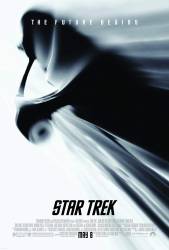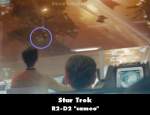Factual error: USS Enterprise's onboard computer initially refuses to acknowledge Chekov's authorization code. The reason, it seems, is Chekov's Russian accent, which pronounces the letter "V" (pronounced labiodentally) like a British "W" (pronounced bilabially). Problem: Chekov pronounces his ensign authorization code in the NATO phonetic alphabet. ("Nine, Five, Victor, Victor, Two", which resolves to 95VV2) This alphabet is specifically designed to alleviate this exact same situation. The 26 code words in the NATO phonetic alphabet are assigned to the 26 letters of the English alphabet: Alfa, Bravo, Charlie, Delta, Echo, Foxtrot, Golf, Hotel, India, Juliett, Kilo, Lima, Mike, November, Oscar, Papa, Quebec, Romeo, Sierra, Tango, Uniform, Victor, Whiskey, X-ray, Yankee, and Zulu. The slightly mispronounced "Wictor" should not be a problem. (00:42:05)

Star Trek (2009)
1 factual error
Directed by: J.J. Abrams
Starring: Simon Pegg, Chris Pine, Bruce Greenwood, Eric Bana, Karl Urban, Zoe Saldana, Anton Yelchin, Leonard Nimoy, John Cho, Zachary Quinto
Plot hole: Despite their awareness of the red matter and the power of the singularity, no one on the bridge had the common sense to suggest pulling back to a safe distance. Nero had already refused their assistance so there was no need to stay so close to the singularity. And when a black hole was created inside Vulcan, an officer mentioned they had to reach minimum safe distance, so they know what they need to do, but no-one does it. (01:00:30)
Leonard 'Bones' McCoy: We've got no Captain and no First Officer to replace him.
Kirk: Yeah, we do. [Sits in captain's chair.].

Trivia: During the Battle of Vulcan, as Sulu goes under a piece of another starship, you can see R2-D2 go flying past just over his shoulder. (00:47:35)
Question: What was Nero doing for the 25 years between his attack on the Kelvin and the one on Vulcan? Additionally, how did he know when and where Spock was to appear? Did he sit his ship in front of the black hole for 25 years? And why was his ship armed to the teeth? It's supposed to be a mining vessel.
Answer: There was a scene cut from the movie that shows Nero being held in Rura Penthe, the klingon prison planet that was attacked in the transmission that Uhura intercepted and translated. The attack was the Narada crew coming to free their commander. And if you were to read the Countdown comic book that is used to give back story to Nero and his relationship with Spock, you'd see that the Narada originally looked nothing like what we see in this film. It was more utilitarian. But after the destruction of Romulus, Nero and crew come across a Romulan space station that is taking in refugees from the doomed planet. They had been working on some technology reverse engineered from Borg technology. Nero offered his ship as a test candidate as they were looking to start field testing it on a ship at that time. And as far as waiting for Spock, it could have been a simple thing to calculate the time and place of Spock's arrival using temporal mechanics based on the size and intensity of the singularity that sent them there, and an educated guess of when Spock entered the anomaly based on the telemetry they had at the moment they entered in themselves. They've had 25 years to wait and calculate what they needed to know.
Join the mailing list
Separate from membership, this is to get updates about mistakes in recent releases. Addresses are not passed on to any third party, and are used solely for direct communication from this site. You can unsubscribe at any time.
Check out the mistake & trivia books, on Kindle and in paperback.




Suggested correction: You're applying today's standards to a fictional future. We've seen in every iteration of Star Trek that security includes both a passkey/password and voice authentication. The actual mistake here is that regardless of how Chekov speaks, the computer should recognize it as his voice because he always speaks that way.
I am afraid the computer's error message leaves no doubt that there was no voice matching at work this time; only pure speech-to-text.
FleetCommand